The following is a guest post by Kpaul. :)

A long time ago, on an Internet far, far away (when I wrote for fun - and for free), I did a piece called Portrait of a Blogger. The year was 2002 and blogging was just beginning to really hit the mainstream hard. If you’re not familiar with the audience at Kuro5hin.org, they’re a snooty version of slashdot readers if you can imagine such a thing. (Mentioning both of these websites is outing my age, I think. I better not mention Compuserve.) The story was published on K5 and is still available today. I was told once that it drew a lot of traffic, although Mr. Foster never would share the exact numbers with me. (I imagine he’s laughing somewhere on his yacht these days.) It’s interesting to see how many of the links are still active in that article.
In any case, I thought about that story the other day when I was lamenting the fact that I didn’t start publishing my own content on my own sites earlier. (I spent the bubble years working for corporate media on the Death Star.) I let the idea of the piece gel in my mind for a while. I knew I couldn’t do another portrait of a blogger piece. I mean, I could, but I don’t think it would do as well as the previous one did. Also floating around in my mind was an okay from the esteemed Aaron Wall to submit a guest post for SEO Book. Eventually, these two ideas crossed paths, exchanged emails, and set-up a plan to combine the old Portrait of a Blogger piece with something relevant for Aaron’s audience.
So, without further ado, I give you a portrait of an SEO circa 2010
The SEO Newbie

Favorite software: SENuke
Favorite website: webmasterworld.com
Favorite drink: Jolt (cause that’s the stereotype and it was in Hackers the movie)
Favorite viral video: Numa Numa
Favorite rapper: 50 cent
A friend of their friend’s sister’s little brother makes money online, so it’s totally going to be possible. The SEO newbie looks forward to a life of an hour of work every week for untold riches. While more and more people are trying to make money online, many of them just don’t have what it takes to work for themselves online. While chasing the magic button - also known as the golden tip, the super duper affiliate secret, or even the extra double tip for making money online - the SEO newbie tends to get distracted from the one obvious thing that equals sucess - i.e. work. Once most SEO newbies find out making money online takes work (more and more of it as time passes and competition increases), they drop out of the game and go back to whatever it was they were doing. Before that, they’re usually found on Webmaster World gabbing about the latest “Google Dance.”
SEO Auto-Blogger

Favorite software: WordPress MU
Favorite website: Any with an RSS Feed
Favorite drink: Watered Down McDonald’s Pop (mass produced sugar water that sorta resembles soda)
Favorite viral video: Lazy Sunday (something everyone copied)
Favorite rapper: Black Eyed Peas
If one page in the SERPs is good, and ten pages in the SERPs is great and so on and so forth, what about 1 billion pages? That would be best, right? But how to write a billion pages worth of content? Enter the auto-blog. This spray and pray method of SEO is still tried by many new to the industry, but it is becoming more and more difficult to keep a site like this going for more than a few months. That’s not to say that it doesn’t exist, but there are few low level auto-bloggers who don’t end up getting burned. And yet auto-bloggers make up a large slice of the SEO landscape. This will undoubtedly change in the years ahead.
The mainstream media also plays this game :D

SEO Link Merchant
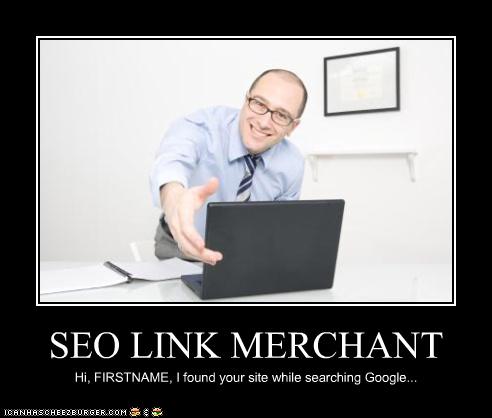
Favorite software: Yahoo! Site Explorer or any Online Link Tool
Favorite website: Any that will buy or sell a link
Favorite drink: Absynth (not legal anymore)
Favorite viral video: Star Wars Kid
Favorite rapper: Tupac
These people live and dream about links. From the value of links to anchor text to placement to link wheels, their world revolves around the power of the link. Since link selling and buying has gone into a shady black market type atmosphere over the last few years, some of these characters can be shady. A common technique is to peddle “text advertisements” for a low monthly rate to unknowing webmasters. While there are some websites and email accounts still operating in the open, there are also black hat link merchants in some very bad neighborhoods. While I probably shouldn’t mention it, there are some who see short term success using these methods. The thing is, online you want to play the long game. And for that, buying and selling links is out.
Phony SEO Guru

Favorite software: The autoresponder
Favorite website: forums.digitalpoint.com
Favorite drink: Acai Juice
Favorite viral video: That annoying frog techno thing!
Favorite rapper: Vanilla Ice
The schemes and scams are plentiful in the world of the phony guru. Yes, you too can make money by showing others how to make money. A lot of these so called gurus don’t even make money on the Internet other than peddling their ebooks and membership sites. The problem with these people is that after a person is burned by so many, they run the danger of not spending ANY money online. This can be just as bad as wasting money on worthless, phony gurus. For example, an SEO Book membership is a wise investment that will pay off in the long run. Don’t be afraid to invest money wisely after being burned by phony SEO gurus.
SEO Tail Chaser
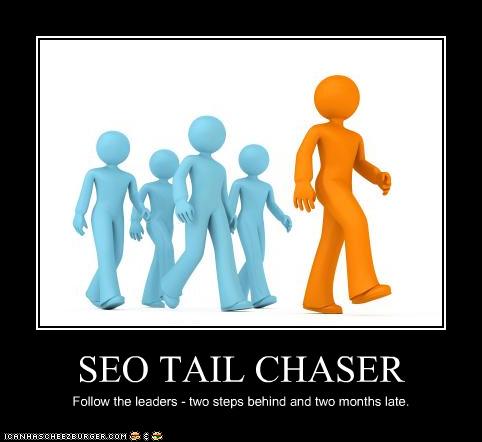
Favorite software: The latest WSO!
Favorite website: warriorforum.com
Favorite drink: Budweiser (or something domestic and bland)
Favorite viral video: Anything their neighbor liked
Favorite rapper: Eminem
Usually found huddling around the phony gurus (which grow in numbers every month it seems as more and more people try to monetize the web), tail chasers are those people who try to copy current successful marketing methods online. If you study the whole rebill period of Internet marketing, there were a few people who started off strong (and somewhat legit), but as more and more people got into the game, the boundaries were pushed more and more. The highlight for me, I think, was seeing an elderly lady talking on a YouTube video about posting links to Google to make money. While some tail chasers may be able to make small (or even moderately large) amounts of money in a short time, they lack the skills (and vision) to replicate the success on a continual basis.
<INTERMISSION>
We interrupt this guest blog post for a shameless plug. On one of my blogs, I’ve started using D&D character alignments instead of ‘colored hats’ to tag various methods for SEO and marketing online. Okay, it’s not really unique and I doubt it catches on, but it gives more opportunities to categorize Internet marketers. We now return to our regularly scheduled guest blog post. Thanks, Aaron!
</INTERMISSION>
White Hat SEO
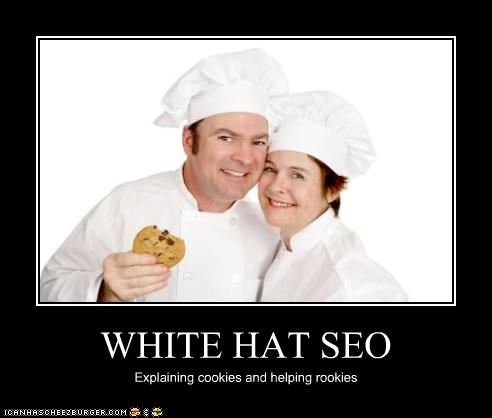
Favorite software: Vanilla Internet Explorer
Favorite website: mattcutts.com/blog/
Favorite drink: Water (good for you)
Favorite viral video: Anything LOL cats
Favorite rapper: DJ Jazzy Jeff & The Fresh Prince
When not wearing their “I Heart Matt Cutts” t-shirt or coming up with ways to make their website more unique and useful for visitors, these individuals like to volunteer at local homeless shelters and nursing homes. But seriously, these people make an effort to do things above board online. Many are still able to make a good living while doing this. Many don’t have the patience for white hat SEO, which is a shame, because it’s one of the better long term methods of success online. Think of your visitor after they get to your site more than trying to trick Google into ranking you high in the SERPs and you’re on your way to becoming a high level white hat SEO, which comes with many special abilities and powers.
Black Hat SEO

Favorite software: xRumer
Favorite website: Any that will take a link - willingly or not
Favorite drink: Whiskey (wine is fine but liquor is quicker)
Favorite viral video: Anything from 4chan
Favorite rapper: NWA
There are some who fall between the tail chasers and the SEO grandmasters (of all persuasions) who have the ability to recognize an opportunity and jump on it, making a bit of money along the way. The problem is that most methods used with Black Hat SEO are short term. They may have a huge payout, but the model is not sustainable unless you can stay somewhat ahead of the crowd when it comes to new things to exploit online. While some are fine with this, most at this level have the ability to come up with unique ideas on their own. When you consider that there’s about the same amount of work involved and the non-black hat techniques last longer, it makes sense to try to get beyond this stage in your SEO evolution.
Grey Hat SEO

Favorite software: A little of this and a little of that
Favorite website: wickedfire.com
Favorite drink: Coffee (some mornings with a dash of rum)
Favorite viral video: Boom Goes the Dynamite
Favorite rapper: Drake
If you mix black and white, you get grey, of course. The grey hat SEO uses both white and black hat techniques. While they’re more open than those who wear a black hat most times, they are generally more cautious than people into white hat SEO. For the most part the mix of both (good and bad) vary at any one time with grey hat SEO. Over the years, this label has morphed somewhat into a blue hat SEO, with a few key differences. Grey hat SEO, to me, means more about techniques while blue hat SEO concentrates on a mixing of web properties with different values.
Blue Hat SEO
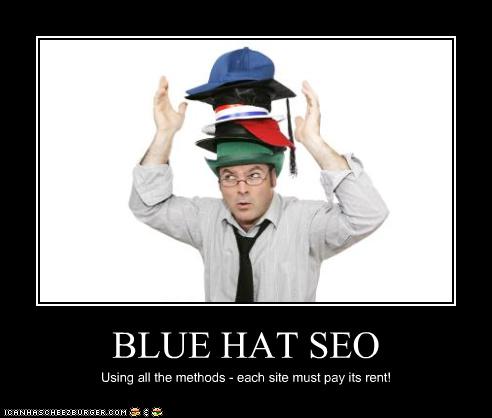
Favorite software: A little of this and a little of that
Favorite website: wickedfire.com
Favorite drink: Coffee (some mornings with a dash of rum)
Favorite viral video: Charlie the Unicorn
Favorite rapper: Ice Cube
I’m pretty sure I know who came up with this phrase, although I’m not exactly sure of their definition of the term. To me, it follows the ‘SEO Empire’ line of thinking that was created by Eli at Blue Hat SEO. So, it would be a mix of pure white and somewhat grey (or downright black) websites in a network online. So, garbage sites at the bottom of the pyramid point up toward the money sites at the top of the pyramid. How this differs from straight grey hat SEO, I’m not sure, but it’s used by quite a few people these days. For the most part, Blue Hat SEO peoeple are well versed in the way the Internet works. And if they don’t have skills, they have someone in their network who does. There are quite a few high level blue hat SEOs currently operating online.
Article Marketer

Favorite software: Google Docs
Favorite website: ezinearticles.com
Favorite drink: Green Tea (proven weight loss, act now!)
Favorite viral video: None (text based viral only)
Favorite rapper: Mos Def (very lyrical)
When they’re not actually banging out articles for their own or other sites, they’re thinking up ideas and topics for their next round of articles. They know the value of content online. This group is split like most others into various levels of quality ranging from garbage to modern literature and everything in between. You will notice if you look closely that the more successful article marketers have higher quality content. This is no coincidence. Of course, good content is only one small piece of the puzzle, but you may want to consider outsourcing your content needs to an article marketer.
Viral SEO Ninja
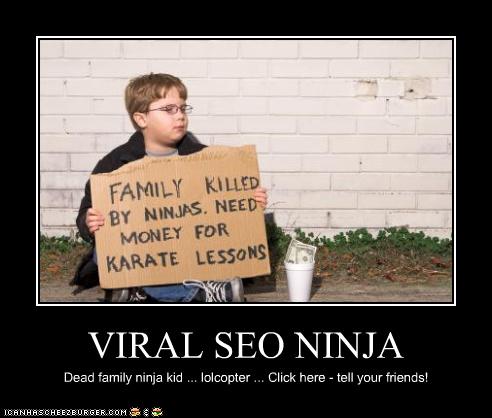
Favorite software: Anything related to email
Favorite website: digg.com
Favorite drink: Tang (it’s orange, it’s different)
Favorite viral video: lonelygirl15
Favorite rapper: Kanye West (marketing magic man - good or bad)
When it comes to linkbait and causing ripples in the blogosphere, there’s nothing like the skills of a high level viral ninja. Part Charlie the Unicorn, part Star Wars Kid, and with a dash or two of LOL cats and one very, very, extremely tiny bit of 4chan, the viral ninja can mix media to send a message, get a laugh, or compel people to tell their friends about the content. As more and more people come online and try to be viral, it’s becoming more and more difficult to be unique and stand out from the millions of other people online who are vying for attention. The viral ninja understands this and is already working on three or four projects that will drown the numbers for the “Please don’t taze me” video.
SEO Grandmaster

Favorite software: LAMP
Favorite website: SEOBook.com
Favorite drink: Vitamin Water (expensive, but worth it)
Favorite viral video: Dancing baby (old school...)
Favorite rapper: Grandmaster Flash
You don’t hear from these people too much on the forums or at conferences. They don’t typically have a very active blog. They do, however, spend their time making money online - most times quite a bit of it. They apply their SEO knowledge quietly in the background, slowly building their empire piece by piece. They understand marketing and business principles and employ them. These people learned early on that wasting time online - especially at forums chasing the magic button - is not a good thing. They learned how to buckle down and apply the knowledge that everyone who’s anyone has. They know it’s all about applying the information rather than just knowing about it. While you don’t hear much from these people publicly, when they do talk quite a few people tend to listen.
Real SEO Guru
Favorite software: Firefox browser + extensions
Favorite website: Any that they own or are involved with
Favorite drink: Orange Pineapple Juice (sweet, sour, but good for you)
Favorite viral video: All Your Base Are Belong To Us (cause they do)
Favorite rapper: Jay-Z (making piles of money)
What are the lyrics from Ghetto Boys about real gangsters not talking much? Go Google it. (Sorry, Matt, it’s a verb now. You know there are secret Google parties celebrating the fact. Smile.) But yeah, real gurus aren’t all talk and no action. Real gurus of the industry don’t pitch anything and everything just to make a buck. The real gurus are few and far between, but they do exist. If you run into one, be nice to them. Unlike the SEO grandmasters, they’re more public and don’t mind interacting with the public. That said, they tend to value their time, so don’t waste it. This path has the most opportunities for people who are into SEO. (In gaming terms, it has the highest level cap.) It’s a long road, and it’s not a quest that can be undertaken alone, but if you’re serious about SEO, this is the route you want to take.
The Future of SEO?
If you’ve been around for any length of time, you know that the Internet is still constantly changing. Some of the changes are for the better and some aren’t as good, but they all are something that everyone who works online has to deal with. The SEO of last week - or even today - isn’t the same SEO that is going to be in operation over the next decade. Personally, I see the word organic being more important.
By organic SEO, I mean not mass produced, not a trick, not a scam, not a scheme, but an actual relationship between publishers and website visitors. The sites that are able to build communities around themselves are going to be the ones that survive, I think. And there is no method of SEO known to man that can create a community - a real one - out of thin air. That said, SEO can be useful to help draw people to a website that is worthy of a community forming around it.
-----
The above was a guest post from K. Paul Mallasch, who runs kpaul media, which publishes local news communities like Anderson Free Press as well as many niche websites. You can contact him at kpaul.mallasch@gmail.com
A disclaimer from Aaron: I thought it was fun, but I loath rap music (especially that from asshats like Kanye West), and I realize that being a publisher in the SEO space is way more profitable than being labeled as an SEO guru. I also didn't put the last picture in because he used me...and I felt that would have been a wee bit egotistical for me to publish a guest post highlighting me like that. ;)
But the post is still a lot of fun & I am sure you can associate with at least 1 or more of the above profiles. If not then you haven't been in the SEO space very long yet! ;)


